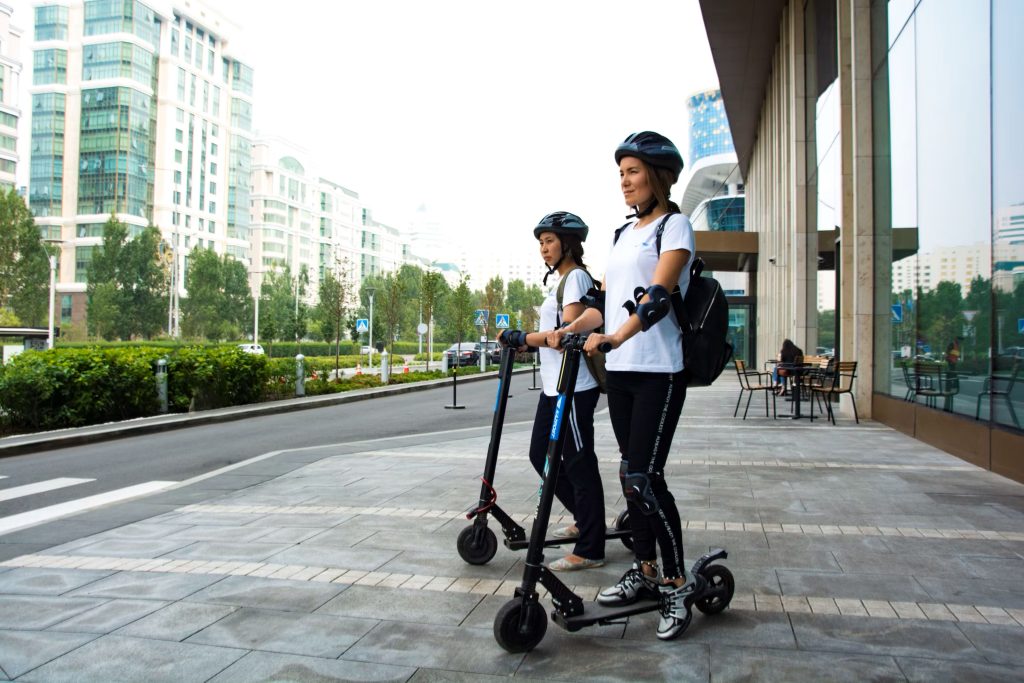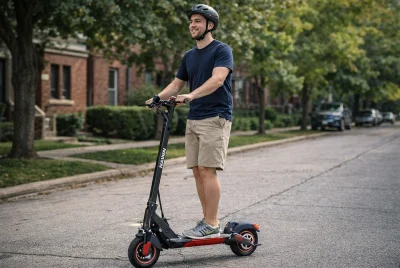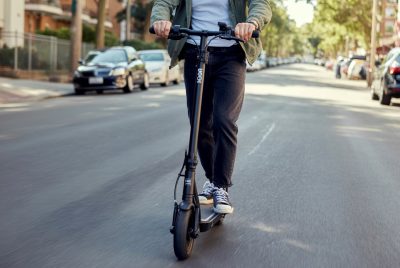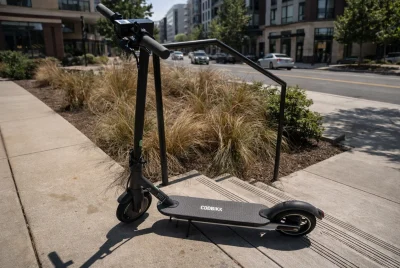Do You Need a License for an Electric Scooter?
*We may earn a commission for purchases made using our links. Please see our disclosure to learn more.
I’ve always been an avid fan of electric scooters. They’re a convenient and eco-friendly way to navigate busy city streets, and they’re just a whole lot of fun to ride. But recently, I found myself pondering a common question among electric scooter enthusiasts: Do you need a license to ride one of these zippy little vehicles? In this comprehensive article, I’ll explore the ins and outs of electric scooter licensing requirements, sharing my insights as a fellow enthusiast and offering detailed reasons for my suggestions.
Introduction
Electric scooters have taken the world by storm, offering a fantastic way to navigate urban landscapes with ease. Whether it’s for your daily commute or a leisurely ride through the park, they’re efficient and eco-friendly. But the burning question is, “Do I need a license to ride one?” I’ll delve into this inquiry as an electric scooter enthusiast, sharing my insights and experiences.
Understanding Electric Scooters
Before we dive into licensing requirements, let’s understand what electric scooters are. These sleek, battery-powered vehicles have become increasingly popular, known for their quiet, emission-free operation and nimble maneuverability. They often have two wheels, a handlebar, and a standing platform, and can reach speeds of up to 30 miles per hour.
Electric scooters are designed to be a sustainable and convenient mode of transportation. They’re commonly used for short trips, reducing the carbon footprint associated with traditional gas-powered vehicles. The electric motor propels the scooter, which is powered by a rechargeable battery. These scooters are not only environmentally friendly but also cost-effective.
Laws and Regulations
Electric scooters are subject to various laws and regulations, which can vary significantly from place to place. The primary factors that influence these regulations are federal and state laws.
Federal Regulations
At the federal level in the United States, electric scooters are typically classified as “motor vehicles.” This classification means they are subject to some federal regulations, but most of the specific rules fall under the jurisdiction of individual states. Federal regulations set the groundwork for safety standards, but states have the autonomy to tailor their own laws.
State Regulations
State regulations regarding electric scooters can be a bit of a maze. Some states have very clear guidelines, while others leave much to local governments. To find out what applies to you, it’s essential to consult your state’s department of motor vehicles or transportation. These state-specific regulations address issues such as licensing, age restrictions, helmet use, and scooter equipment standards.

State laws may require electric scooter riders to follow certain safety measures. For instance, wearing a helmet is mandatory in many places. This is a crucial aspect of rider safety, especially for riders of all ages.
Age Requirements
One of the most critical considerations is the minimum age for operating an electric scooter. Since electric scooters can reach notable speeds, states often impose age restrictions to ensure the safety of riders and those around them.
Age requirements can vary widely from one state to another. While some states allow teenagers as young as 14 to ride electric scooters, others set the minimum age at 18. It’s essential to know your state’s specific age requirements to ensure you’re compliant with the law.
Licensing Requirements
The big question: do you need a license to ride an electric scooter? The answer varies depending on where you live and the type of electric scooter you’re operating.
Driver’s License
In many states, you’ll need at least a standard driver’s license to operate an electric scooter legally. This makes sense because electric scooters can share the road with other vehicles and require a basic understanding of traffic laws. A driver’s license ensures that you have a fundamental knowledge of road safety rules, which is essential for navigating streets safely.
Motorcycle License
Some states classify electric scooters as mopeds or motor-driven cycles. In such cases, a motorcycle license may be necessary. These licenses typically require additional training and testing to ensure the rider’s ability to safely operate the scooter. A motorcycle license demonstrates that you have received the training required to handle a motor-driven two-wheeler.
No License Required
In contrast, some states don’t require any license to operate an electric scooter. This is more common for low-powered scooters, often with a maximum speed limit of 20 or 25 miles per hour. These scooters are typically considered less powerful and can be operated without a license.
The classification of electric scooters can also influence the licensing requirement. In many states, scooters with a motor that is below a certain wattage are considered bicycles and do not require a license. These scooters are often designed for short trips and have a limited top speed.
It’s important to emphasize that these regulations may change over time, and new legislation may be introduced. It’s essential to stay updated with the latest laws and regulations in your area.
Insurance Considerations
When you’re riding an electric scooter, it’s crucial to consider insurance. While it might not be a legal requirement in every state, it’s wise to have some coverage. Accidents can happen, and having insurance can protect you from potential liabilities.
Some states may require insurance coverage for electric scooter riders, while others do not. Even if it’s not mandated by law, having insurance provides peace of mind. In the event of an accident, insurance can help cover medical expenses and damage to your scooter.
Riding without insurance can be risky, as you may be personally responsible for any costs associated with accidents or injuries. Having insurance adds an extra layer of protection, ensuring that you’re financially prepared for unforeseen circumstances.
Safety Precautions
Safety is a top priority when it comes to electric scooter riding. Here are some essential safety precautions to keep in mind:
- Wear a Helmet: Wearing a helmet is crucial for protecting your head in case of an accident. Many states have laws mandating helmet use for electric scooter riders. Even if it’s not legally required in your area, it’s a smart safety measure.
- Follow Traffic Rules: Electric scooters share the road with other vehicles. Obey traffic laws, stop at red lights and stop signs, and yield the right-of-way when necessary.
- Use Hand Signals: Just like when riding a bicycle or motorcycle, using hand signals to indicate turns is essential for safety. This helps other road users understand your intentions.
- Check Your Scooter: Before each ride, inspect your scooter to ensure that it’s in good working condition. Check the brakes, tires, and lights to avoid accidents caused by equipment malfunctions.
- Stay Aware: Be vigilant and aware of your surroundings. Avoid distractions, such as using a phone or wearing headphones, as they can impair your ability to react to potential hazards.
- Respect Pedestrians: Electric scooters are faster than walking, but they are not a substitute for sidewalks. Avoid riding on sidewalks and always yield to pedestrians.
By following these safety precautions, you can enjoy your electric scooter rides while minimizing the risks associated with them.
Public vs. Private Property
Understanding where you can ride your electric scooter is equally important. Many states differentiate between riding on public roads and private property. This means you might not need a license if you only ride your scooter on private property, like your own driveway or within a gated community.
Public Property: When riding on public roads and streets, you’re subject to all applicable traffic laws and regulations. These laws typically require a valid driver’s license or, in some cases, a motorcycle license.
Private Property: On private property, the rules may differ. You may not need a license to operate your electric scooter within a private, enclosed space, such as a gated community. However, this varies depending on local rules and homeowner association guidelines.
While riding on private property may not require a license, it’s essential to familiarize yourself with any specific rules and regulations that apply in those areas. Always respect the property owner’s regulations and guidelines.
Local Variations
Local ordinances can further complicate the issue. Some cities and municipalities have specific rules for electric scooters that may differ from state regulations. It’s crucial to research and stay informed about local laws.
Local variations can include restrictions on where you can ride, speed limits, and parking regulations for electric scooters. These ordinances are often created to address the unique challenges and opportunities that electric scooters present in urban environments.
For example, some cities may have designated scooter lanes, while others may restrict scooter usage in certain areas, like busy downtown districts. It’s essential to familiarize yourself with local laws and regulations to ensure you’re riding in compliance with the rules of your specific location.
Electric Scooter Rentals
If you’re considering renting an electric scooter from a service like Lime or Bird, the rules may differ from using your private scooter. Rental services often have their own terms and conditions, so be sure to read and understand them.
Electric scooter rental services have gained popularity in many urban areas, offering a convenient way to access scooters for short trips. When renting an electric scooter, it’s essential to understand the terms and conditions set by the service provider. These may include age requirements, helmet mandates, and specific areas where you can pick up or drop off scooters.
In most cases, rental companies require riders to be at least 18 years old. This age requirement is often consistent with local regulations for privately owned electric scooters. It’s essential to adhere to the rules established by the rental service to avoid any potential legal issues.
Why Licensing Matters
You might be wondering why all these licensing requirements matter. The answer is simple: safety. Licensing ensures that riders are aware of the rules of the road and can safely operate their scooters. It also provides a legal framework to hold individuals accountable in case of accidents or violations.
Licensing requirements help promote safety by ensuring that riders have a basic understanding of traffic laws and road safety. This knowledge is vital for navigating streets and sharing the road with other vehicles. Without these requirements, there would be a higher risk of accidents and a lack of accountability in the event of incidents.
Licensing also helps maintain order on the road. It provides a legal basis for law enforcement to address violations and promote responsible scooter usage. Having a standardized set of rules makes it easier to educate and enforce safety measures.
Penalties for Non-Compliance
Lastly, it’s essential to understand the consequences of non-compliance. Riding an electric scooter without the required license can result in fines, citations, or even having your scooter impounded. It’s crucial to follow the rules to avoid legal trouble.
Penalties for non-compliance can vary widely depending on your location and the specific violation. In some cases, fines can range from a few dollars to several hundred dollars. Additionally, repeated violations can lead to more severe consequences, such as the suspension of your driver’s license or impoundment of your scooter.
Avoiding penalties and legal issues is a good reason to comply with the licensing requirements in your area. It’s not only about personal safety but also about abiding by the law and respecting the rights of other road users.
Conclusion
In conclusion, whether or not you need a license to ride an electric scooter depends on various factors, including your location, the type of scooter, and its intended use. Licensing requirements exist to promote safety and accountability, and it’s in your best interest to comply with them. Always prioritize safety when riding your electric scooter, regardless of the legal requirements in your area.
Frequently Ask Questions (FAQs)
Q1: Do I need a driver’s license to ride an electric scooter?
The licensing requirement for riding an electric scooter varies by state and the type of scooter. In many states, a standard driver’s license is required, but some may allow riding without a license, especially for low-powered scooters.
Q2: Can I ride an electric scooter on the sidewalk?
Sidewalk regulations also differ by location. In some areas, it’s allowed, while in others, it’s prohibited. Always check your local laws to ensure you’re riding your electric scooter in compliance with the rules.
Q3: Are there age restrictions for electric scooter riders?
Yes, many states impose age restrictions to ensure the safety of electric scooter riders. The minimum age requirement can vary, so consult your local regulations to determine the age at which you can legally operate an electric scooter.
Q4: Do I need insurance for my electric scooter?
While insurance is not a legal requirement in every state, it’s a wise choice to protect yourself in case of accidents or liabilities. It’s crucial to have insurance coverage to ensure you’re financially prepared for unexpected situations.
Q5: What should I do if I receive a citation for riding without a license?
If you receive a citation for riding without a license, it’s essential to address it promptly. You may need to pay fines or take necessary steps to comply with local regulations. Consult legal advice if needed, and make sure to obtain the required license to avoid future violations.




